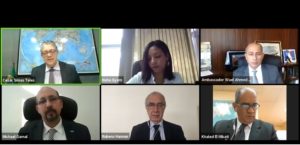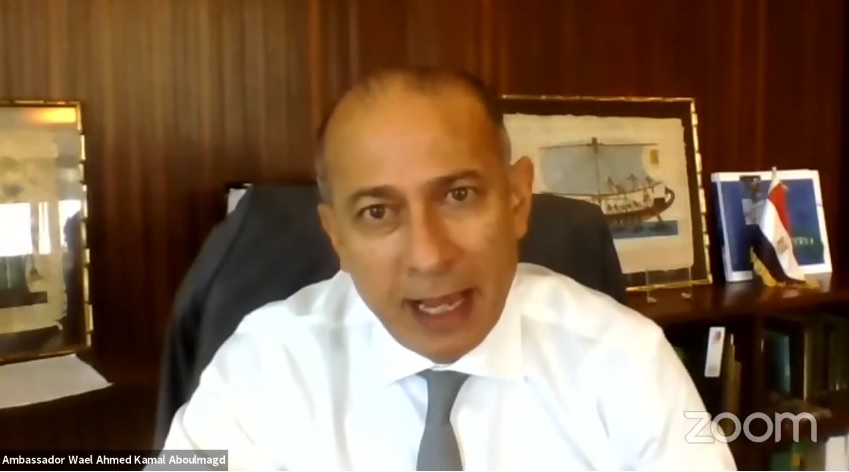São Paulo – The ambassador of Egypt to Brasília, Wael Ahmed Kamal Aboulmagd (pictured above), said during an Arab Brazilian Chamber of Commerce (ABCC) webinar that the talks involving Brazilian and Egyptian aviation authorities for an airline route connecting São Paulo and Cairo are on the verge of completion. The webinar “Egypt and Brazil – Opportunities and Partnerships” was held this Wednesday morning (2).
“We know what this will mean in terms of tourism and business. We are in the final stage of talks for a nonstop Brazil-Egypt flight. It would not be an overstatement to say that it will be a matter of weeks before the first flight takes off. We are working out the final details of negotiations, and an announcement should be made very soon. It will be a significant change on multiple levels. This is a priority for both governments, and Brazil is truly cooperating with us,” the ambassador said.
According to him, a nonstop flight or a dedicated shipping lane would help enhance Brazil-Egypt trade flows. He said that partnerships and cooperation are vital to driving up bilateral trade, and that Egypt can act as a gateway for Brazilian goods to reach the entire African continent.
EgyptAir had said last July that its pre-pandemic expansion plans, which included nonstop flights to Brazil, had to be put on hold due to Covid-19.
The ambassador’s assertions came in response to Mostafa Sherif El Gabaly, vice president of Egypt’s Chemicals and Fertilizers Export Council. “We cannot discuss trade without a nonstop route between our countries. We have been discussing that with EgyptAir for 15 years now. A nonstop Cairo-São Paulo route would be a major step ahead,” he argued.

According to El Gabaly, even though Egypt supplies large amounts of fertilizer to Brazil – and could supply even more –, emphasis must be placed on other goods and services right now. He also discussed the Mercosur-Egypt free trade agreement as a factor in getting Brazilian investors to look into Egypt; the establishment of a Brazilian-Egyptian trade council; and the need for more business missions.
The agricultural attaché at the Embassy of Brazil in Cairo, Cesar Simas Teles, said a nonstop flight might enable new deals to come to fruition. “We could fly strawberry into Brazil and papaya into Egypt, for instance,” he said. He also said that the biggest obstacles to Brazilian-Egyptian trade are the unavailability of information to businesses, the language barrier, and the need for a dedicated shipping lane and a nonstop flight.
Teles discussed opportunities in agriculture, with Egyptian items newly approved for export under the Mercosur-Egypt agreement, such as garlic, olives, grapes, and citrus fruits. He also envisions potential sales of onions and cheese in the near future. He said that cooperation is possible in genetic improvements of livestock and dairy, and that his plans for next year include promoting Brazilian coffee in Egypt.
Arab Brazilian Chamber secretary-general Tamer Mansour, who moderated the event, remarked that organization’s job involves liaising with multiple entities in order to encourage partnerships between countries. “I believe that Egypt-Brazil relations should be about more than just imports and exports. Strategic partnerships could take our relations to the next level. This is our role: we need to bring that information so we can make life easier for exporters and importers.”

Mansour also said that the ABCC is working with Egyptian embassies to streamline export-related paperwork requirements through online issuance of certificates of origin. “The Arab Chamber’s blockchain system could be a very fast alternative, one that would cut times and costs,” he said. The ABCC recently announced its new Ellos platform, whose purposes include going fully online with blockchain-based export processing.
According to the secretary-general, within two weeks the ABCC will announce a partnership with the Confederation of Brazilian Trade Associations (CACB) – which issues Mercosur-Egypt certificates – to usher in online issuance. “That will make trade much easier, and it will enable exporters and importers to take advantage of the free trade agreement. Many business owners are not aware of how they can tap into the agreement to get preferential tariffs,” he said.
ABCC president Rubens Hannun opened the webinar by thanking the speakers and their organizations for joining in and for being partners.
The minister-counsellor and head of Commercial Promotion at the Embassy of Brazil in Cairo, Rubem Mendes de Oliveira, was also featured during the opening. He mentioned the ease of registering a business, the equivalence of certificates, and the lifting of consular registration charges as steps taken in Brazil to facilitate trade with Egypt.
The head of the Egyptian Economic and Commercial Office in São Paulo, Noha Syam, discussed the Mercosur-Egypt free trade agreement and the appealing tariffs on Brazil-Egypt deals. “This is a great opportunity for Brazilian enterprises to make their way into new markets,” she said, in reference to Egypt’s ability to distribute products across the African continent.
Egyptian Exporters Association (Expolink) chairman Khaled El Mikati said, among other things, that Brazil and Egypt could join forces and help enable food security in other African countries, through partnerships and technical cooperation.
The director-general for Bilateral Trade Agreements at Egypt’s Ministry of Industry, Michael Gamal, gave a presentation on the Mercosur-Egypt free trade agreement. He discussed economic indicators and the potential of Brazil-Egypt exports. “We have free trade agreements with 77 different countries. Therefore, Egypt’s market isn’t ‘only’ 100 million consumers: it’s over 2 billion consumers,” he said.
Finally, ABCC Market Intelligence coordinator Marcus Vinícius discussed Brazil-Egypt trade figures. He pointed out that Egypt’s exports picked up in the wake of the Mercosur-Egypt free trade agreement: “Imports of goods from Egypt to Brazil have benefited the most from the agreement. From 2017 to 2019, sales of items covered in the agreement increased by 122.5%, whereas sales of items not covered increased by 76%.”
You can watch the full event here:
Translated by Gabriel Pomerancblum




